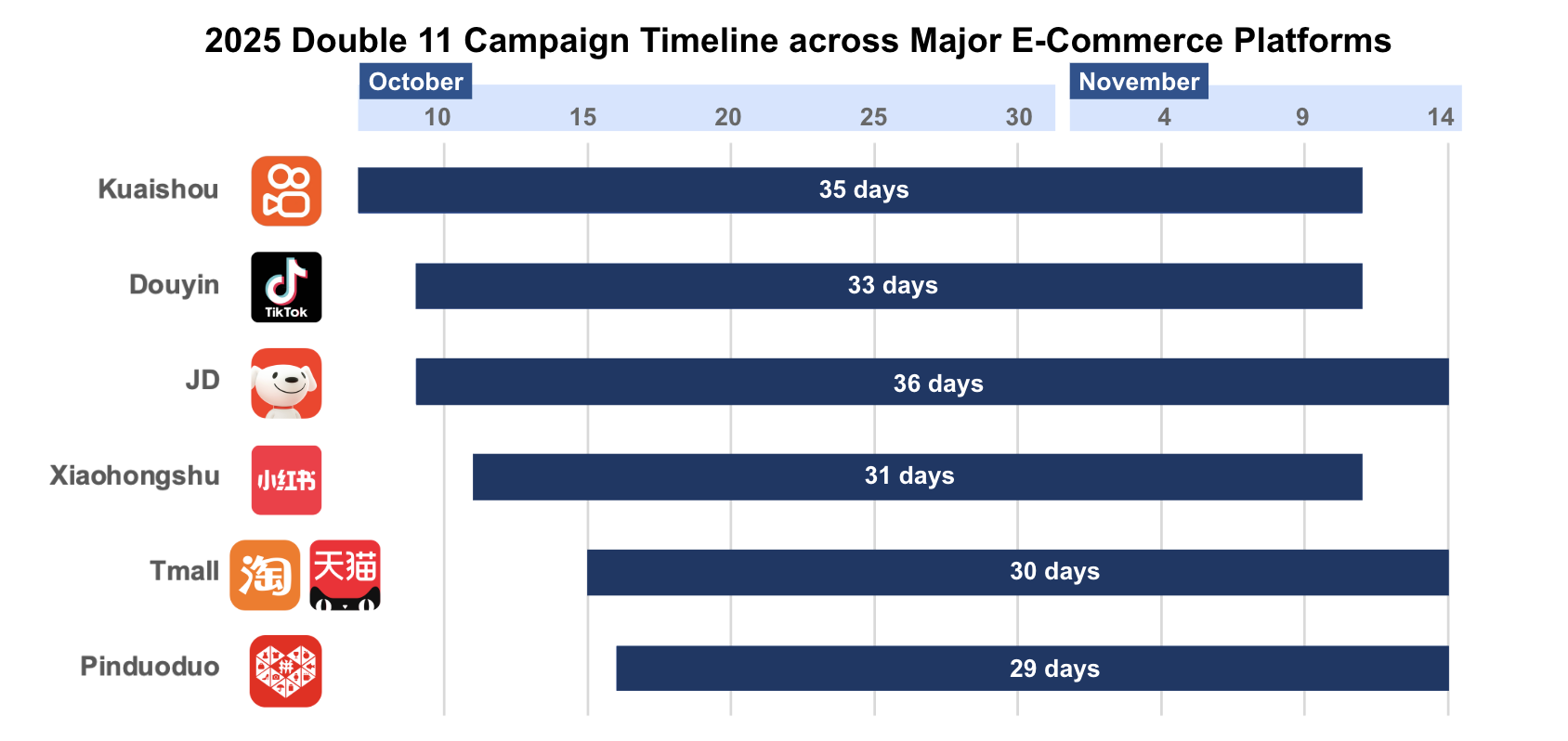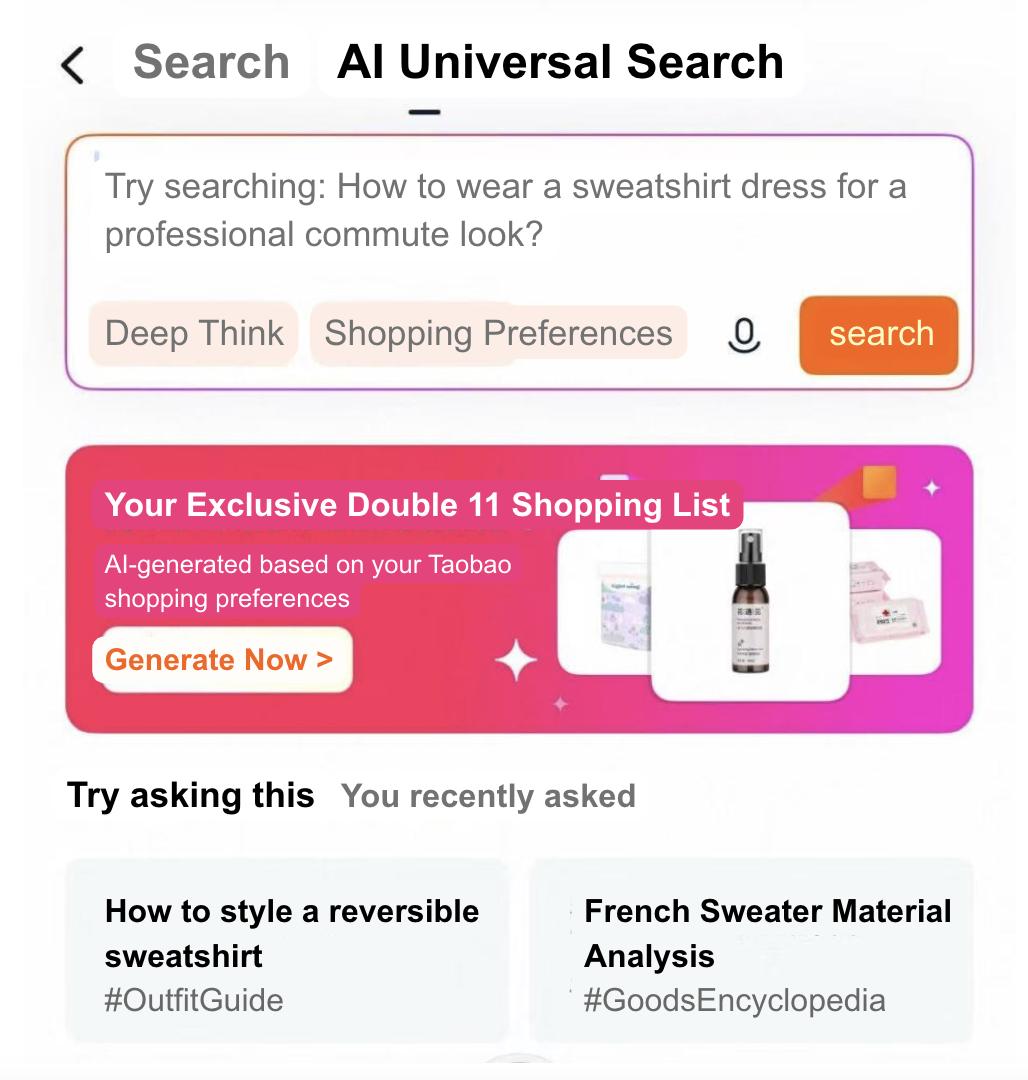Launched by Alibaba Group on 11 November 2009, the shopping festival was initially designed to boost sales during the low-season interval between China’s Golden Week and year-end holidays. Over time, the event grew not just in scale but in strategic importance. As such, the role of Double 11 2025 has shifted from being simply a promotional event to becoming the structural driver in the Chinese e-commerce ecosystem. It influences how platforms structure user engagement, how brands time launches, and how consumers plan purchases. This shift reflects the broader maturity of China’s digital retail market, where discount fatigue and consumer sophistication have emerged.
Download our China emerging-tier cities report
Prolonged festival, simplified mechanics
Double 11 2025 features an elongated timeframe and streamlined promotional rules as compared to previous ones.
Campaigns that spanned over 30+ days
Major e-commerce platforms kicked off early. Kuaishou Technology raced ahead on October 7. According to various media, the campaign spans from October 9 through to November 14 (approximately 37 days) on platforms such as JD.com, Xiaohongshu, and Tmall.

Simplified mechanics for Double 11 2025
A key structural shift this year showed that instead of complex coupon stacking, the platforms emphasize direct markdowns and simpler discount structures. For example, certain categories of “official price cuts” replace complicated “spend X, save Y” mechanics.
From a consumer standpoint, this simplification reduces decision fatigue and expands accessibility. This is particularly true among older or less promotion-savvy shoppers. It also reflects that platforms are increasingly treating Double 11 less as a one-day spectacle and more as a phase in the regular retail calendar.
Positive consumer sentiment from social media
Early social listening across Weibo, Douyin, and Xiaohongshu suggests a predominantly positive consumer response to the elongated Double 11 2025 cycle.
Consumers appreciated the stress-free shopping experience, frequently noting that “this year feels calmer” and “no need to stay up till midnight for deals.” The simplification of rules, especially the replacement of complex coupon systems with direct discounts, generated a sense of transparency and trust, reducing the cognitive load traditionally associated with Double 11.
However, while some users welcomed the “return to rational consumption,” others voiced that the event “lacks excitement” compared to the pre-2022 frenzy.
On-demand retail and instant delivery as new variables
In 2025, the most visible shift within the Double 11 ecosystem is the rise of instant retail. A model that replaces “buy now, wait later” with “buy now, get now.” What began as a logistical experiment has matured into a trillion-yuan market reshaping China’s retail industry. The transformation reflects both consumer fatigue with complex pre-sales and platforms’ urgency to rebuild trust and simplicity into large-scale promotions.

Leading players such as Meituan, JD.com, and Taobao are competing fiercely to redefine immediacy. Among them, Meituan Flash Purchase stands out as the clearest embodiment of the new logic. Its “no pre-sale, no deposit, no calculation, 30-minute delivery” model turns consumption from a delayed transaction into an instant experience.

Meituan’s entry into Double 11 as an independent participant signals a fundamental reorientation of the festival’s value proposition. During the 2025 618 Shopping Festival, Meituan Flash drew over 100 million users and doubled sales across more than 60 categories, proving that consumers increasingly prioritize speed and convenience over marginal price cuts.
Beyond satisfying shoppers, the instant-retail model is also revitalizing merchants. Local retailers integrated into Meituan’s network benefit from proximity logistics and diversified exposure, creating a virtuous cycle in which faster fulfillment drives stronger demand and sustained engagement.
AI-powered shopping in Double 11 2025
Artificial intelligence has shifted from being an experimental tool to becoming a central pillar of the Double 11 experience. Taobao and Tmall branded the 2025 campaign as their first fully AI-powered festival.
AI in platform operations and shopping experience
Artificial intelligence has shifted from being an experimental tool to becoming a central pillar of the Double 11 2025 experience. Taobao and Tmall branded the 2025 campaign as their first fully AI-powered festival, launching six major tools, including AI Universal Search, AI Try-On, Snap & Shop, and personalized Category Lists. These tools reportedly improved search relevance by 20%, increased feed click-through rates by 10%, and boosted merchant ad ROI by 12%.

Social media also amplified AI adoption. On Xiaohongshu, the viral trend of “AI 凑单” (“AI cart optimization”) saw shoppers using tools like Deepseek or Taobao’s own AI to list products and coupons for Double 11 2025, then letting the AI calculate the most cost-efficient way to reach full discounts. Posts showing these prompts often received thousands of likes, illustrating how consumers are actively experimenting with generative-AI shopping strategies.
Low consumer awareness
Yet despite these advancements, consumer adoption remains uneven. A Tencent Technology survey found that nearly 60% of users were unaware of AI features, and over 70% were unsure of how to access them. This disconnect reveals a critical challenge: while platforms are technologically prepared. Users need clearer pathways to adopt and trust these tools.
Globalisation of the Double 11 shopping festival
As China’s domestic e-commerce market matures, the Double 11 2025 Festival is expanding globally. In 2025, Taobao Global launched simultaneously in twenty countries and regions, including Hong Kong, Malaysia, and Australia. The platform is offering localized interfaces in multiple languages and investing RMB one billion to help 100,000 merchants grow overseas. Improved cross-border logistics now provide free shipping and returns in twelve international markets. In contrast, instant AI-based translation of reviews has improved foreign shopper confidence and boosted conversion rates by as much as 47% in Kazakhstan.
Redefining Double 11 2025: Instant delivery and AI take center stage
- Double 11 is no longer a single-day sales spike but a prolonged retail season (over 37 days). This requires brands to maintain engagement and activation for an extended period.
- The rise of on-demand platforms like Meituan, with “buy now, get now” models and no pre-sales, is reshaping the festival. This makes delivery speed and convenience as important as price.
- Platforms have shifted from confusing coupon-stacking to direct price cuts and transparent offers to combat consumer discount fatigue and create a more trustworthy, less stressful shopping experience.
- Artificial intelligence is now a core part of the shopping journey, powering search, recommendations, and cart optimization. However, a significant awareness gap means many users are still unaware of or don’t know how to use these new AI tools.
- Double 11 is actively expanding beyond China, with platforms launching localized sites, improving cross-border logistics, and using AI translation to build trust and capture new international markets.

